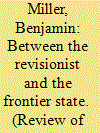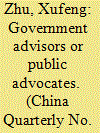| Srl | Item |
| 1 |
ID:
087932


|
|
|
|
|
| Publication |
2009.
|
| Summary/Abstract |
This article explains variations in state war-propensity. I introduce a new typology of state war-proneness based on four major types of states: revisionist, failed, frontier, and status quo. The major novel contribution of this essay is the argument that the combined effect of variations in the extent of success in state-building (strong or weak states) and nation-building (nationally congruent or incongruent) shapes the level and the type of state violence by producing different categories of states with regard to their war-propensity. Strong states but nationally incongruent generate revisionist states, which initiate aggressive wars. The combination of state strength and national congruence leads to a status quo state. Weakness and incongruence bring about civil wars and foreign intervention in 'failed' states. Weakness but congruence produce the 'frontier state' with boundary and territorial wars, but also with a reasonable likelihood of evolution of status quo orientation over time. I focus here on key examples of these types of states, especially from two regions: Iraq and Lebanon in a highly war-prone region - the post-World War II Middle East; and Argentina and Brazil in a more peaceful one, at least in the 20th century - South America, although these states experienced quite a number of wars in the 19th century.
|
|
|
|
|
|
|
|
|
|
|
|
|
|
|
|
| 2 |
ID:
107296


|
|
|
|
|
| Publication |
2011.
|
| Summary/Abstract |
Think tanks in China simultaneously play advisory, academic and advocacy roles in the policy process. In this article, I recommend an analytical framework that evaluates think tanks by studying their specific activities in addition to their nature. Empirical data involving 301 think tanks in 25 provinces were collected through the China Think Tank Survey 2004. The 1998 regional Integrated Knowledge Development Index database was also used for the analysis. Based on these two independent sets of survey data, the article concludes that connections with the government and knowledge capacity in regions where think tanks are located are the two differing forces that drive China's think tanks to operate as either advisors or advocates. Moreover, these two determinants differentially influence the individual roles of the two types of think tanks.
|
|
|
|
|
|
|
|
|
|
|
|
|
|
|
|